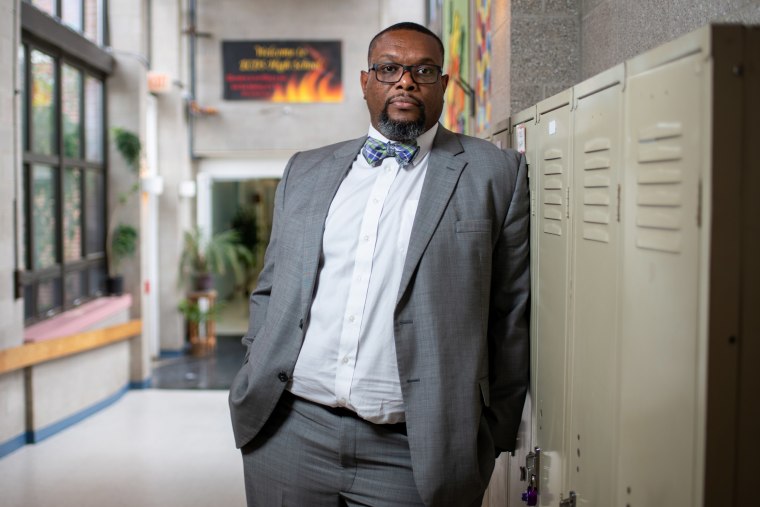When Rydell Harrison started a new job as a school superintendent in southwestern Connecticut last August, he was excited to join a community that seemed committed to diversity and equity.
The Easton, Redding and Region 9 district, which covers two small, mostly white towns, had recently established a task force and allocated money to address the racial climate in schools. That decision was a response to the hundreds of students and recent alumni who wrote to school board members following George Floyd’s murder to describe racist incidents they’d experienced or witnessed at school. To Harrison, the task force was a sign that the community sat up and listened when young people advocated for change.
Things shifted, however, after the riot at the U.S. Capitol in January.
Some local residents started to complain that the diversity efforts were Harrison’s “agenda,” rather than something students and alumni requested. They labeled Harrison, the district’s first Black superintendent, an “activist” pushing to indoctrinate students with critical race theory. School board meetings filled with opponents lasted late into the night.
A mailer sent to community members from Nonpartisan Action for a Better Redding, a conservative nonprofit group, featured a Facebook post Harrison had written condemning conspiracy theories that fueled the Capitol riot, and it urged people to complain to school board members about him. Others mailers came from a political group called Save Our Schools, run by two Easton residents who no longer have children in the district, and questioned whether the district had a problem with bias and discrimination at all.
Harrison began to doubt whether he could lead the community on its diversity efforts in the face of so much opposition. At the end of June, he announced that he would resign.
“People have asked me, ‘Was it one flyer too many?’ And it wasn’t just this one thing,” Harrison said. “It was the collection of all of these pieces and the emotional and personal toll to be a Black man doing this work and facing very blatant attacks left and right.”
Harrison is one of a small but growing number of educators who have left their jobs after school districts became inundated in recent months by furious parents who’ve accused them of teaching critical race theory, an academic framework usually taught in graduate schools that posits racial discrimination is embedded within U.S. laws and policies. Administrators at virtually every district facing these conflicts — including Harrison’s — have insisted they don’t teach critical race theory, but conservative activists are using that label for a range of diversity and equity initiatives that they consider too progressive, prompting lawmakers in 22 states to propose limits on how schools can talk about racial issues.
“In education, we have responded to opposition with truth and facts and being able to say, ‘Yeah, I can see why that’d be a concern, but this is what is really happening.’ In most cases that works for us,” Harrison said. “But when facts are no longer part of the discussion, our tools to reframe the conversation and get people back on board are limited.”
"This is going to cause an exodus among an already scarce recruiting field in education."
Kumar Rashad, Louisville math teacher
Against the backdrop of hostility to discussions of race in schools — and as five states have passed laws limiting how teachers can address “divisive concepts” with students — administrators and teachers across the country say they have been pushed out of their districts. Some have opted to leave public schools entirely, while others are fighting to save their career. The result in these districts is what educators and experts describe as a brain drain of those who are most committed to fighting racism in schools.
In Southlake, Texas, at least four administrators who were instrumental in crafting or implementing a plan combat racial and cultural discrimination in the Carroll Independent School District left the district this spring following a community backlash to diversity and inclusion efforts.
In Eureka, Missouri, the only Black woman in the Rockwood School District’s administration resigned from her position as diversity coordinator after threats of violence grew so severe that the district hired private security to patrol her house.
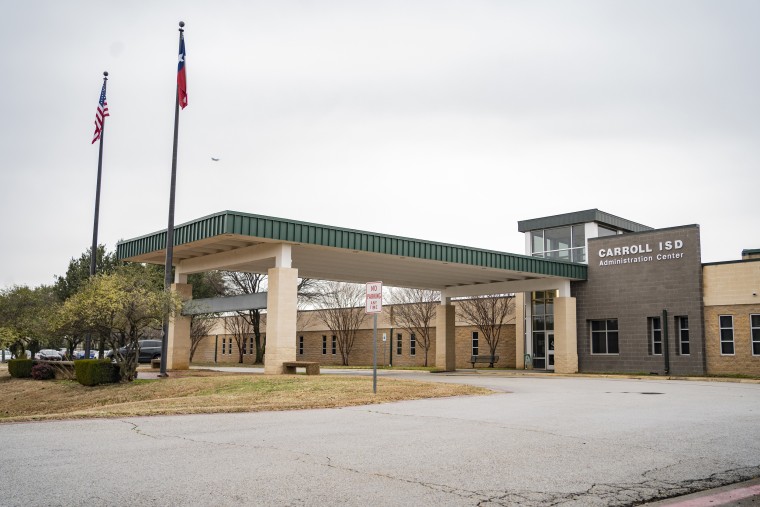
“This is going to cause an exodus among an already scarce recruiting field in education,” said Kumar Rashad, a Louisville, Kentucky, math teacher and local teachers union leader. “People aren't entering the field as much as they were, and now we have this to chase them away.”
In Sullivan County, Tennessee, Matthew Hawn, a white high school social studies teacher, is facing termination after assigning an essay on President Donald Trump by writer Ta-Nehisi Coates and showing a video of a poetry reading about white privilege that included curse words. The district accused Hawn, who is appealing to save his job, of not showing opposing viewpoints. Both Hawn and the district declined to comment.
In Florida, Education Commissioner Richard Corcoran said “we made sure” that Amy Donofrio, a white English teacher in Jacksonville, was fired for displaying a Black Lives Matter banner in her classroom at Robert E. Lee High School. Donofrio, who was removed from teaching duties by school officials in March but has not yet been fired, has sued the district, claiming administrators violated her free speech rights and retaliated against her for advocating for Black students.
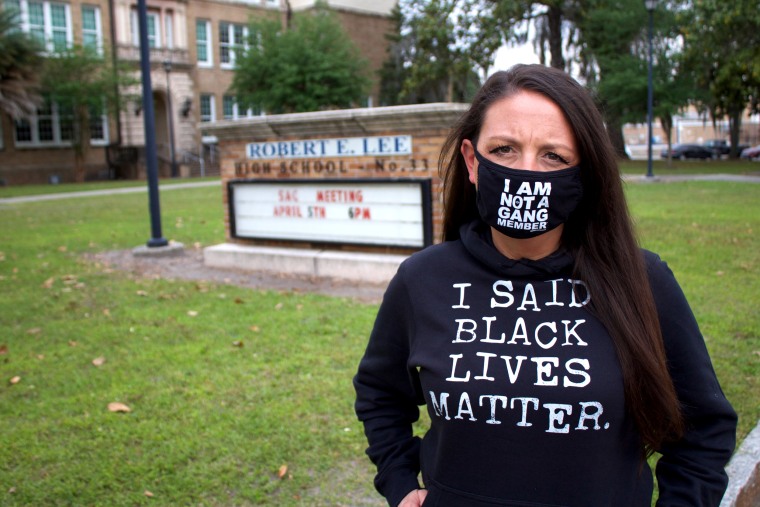
“It felt like waking up in a horror movie,” Donofrio said. “Not just for what it means for me — which is obviously terrifying, this is my career, this is my life’s work — but horrifying because of the message it sends to teachers throughout the state of Florida.”
Donofrio’s suit is pending in federal court, and the district declined to comment. The Florida Department of Education did not respond to a request for comment.
Jonathan Friedman, director of free expression and education at PEN America, a free speech advocacy group, said it’s “highly alarming” that educators are resigning, facing dismissal and fearing for their lives due to conversations about racism and diversity.
“There is great risk that a creeping censoriousness will overtake our public schools, purging them of a diversity of teachers and talent and winnowing the critical lenses through which young people should be encouraged to view history and society,” he said.
'Look at how he was treated'
On May 25, the anniversary of Floyd’s murder, school board members for Connecticut’s Easton, Redding and Region 9 district debated over Zoom until 2 a.m. on whether to endorse a statement committing to equity and diversity. They ultimately passed it, but only after eliminating the words “equity” and “systemic” over Harrison’s objections.
Harrison felt he was losing ground if even the concept of systemic racism was still up for debate.
“Trying to explain to someone that systemic racism is a thing, at the core of that you’re trying to show that my lived experiences as a person of color matter,” Harrison said.
At the same meeting, school board members also argued over whether to survey middle and high school students and parents on their experiences with discrimination. The survey would be anonymous and optional, but some residents and board members didn’t want sixth graders to be asked for their gender identity or sexual orientation, so they tabled it. Board members agreed to the survey a week later after clarifying that students could only take it if their parents gave permission.
At a June 30 school board meeting, five days after Harrison announced his resignation, several residents said they hoped the district would change course on anti-racism efforts.
One resident said he hoped the next superintendent “will steer our kids away from the fringes of ideology.” Dana Benson, one of the residents running Save Our Schools and a local Republican donor, said that without the assumptions of critical race theory, there would be no need for the district’s diversity and equity plans.
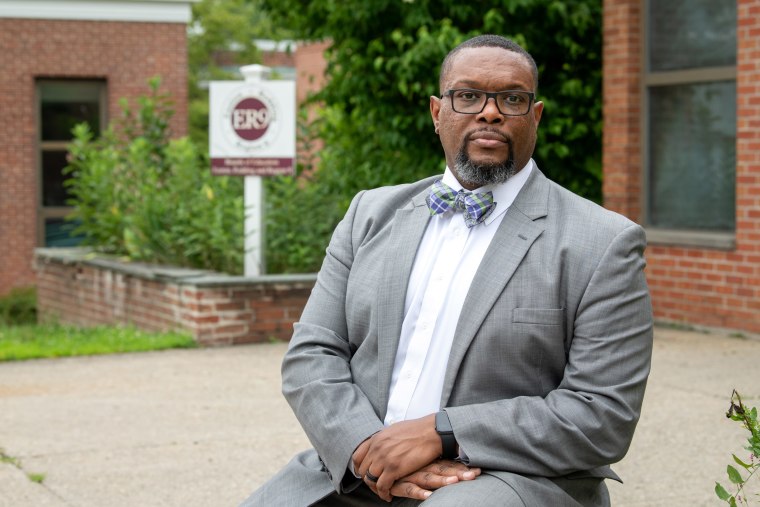
Heather Whaley, a school board member and chair of the diversity and equity task force, reminded her colleagues that the efforts to combat discrimination predated Harrison.
"Dr. Harrison came to a district that was looking to do that work, and look at how he was treated," she said, apologizing to Harrison for the attacks he’d weathered.
Harrison hopes his departure is not seen as him giving in to his critics. He will leave his post in September and go to work for the Connecticut Center for School Change, a nonprofit education consultant organization, where he’ll advise schools on diversity and equity policies.
“I’m ready to be engaged in the next level of work, to keep this going and stay in the fray,” he said.
He’s far from the only superintendent to face such animosity.
AASA, the professional organization of school superintendents, received so many calls from administrators asking for help that it started hosting virtual sessions for superintendents to discuss how they were handling the anti-critical race theory protests, said Daniel Domenech, the association’s executive director.
According to Domenech, some superintendents described how the stress carried over into their personal lives, causing them to lash out at family members. In several cases, school boards threatened to fire superintendents if they didn’t eliminate diversity and equity initiatives, he said.
"I've seen some tough times in my years as a superintendent but nothing like what these people have gone through this year and probably will continue to next school year,” said Domenech, who was superintendent of the school district in Fairfax County, Virginia, during the 2002 Beltway snipers attacks and the terrorism of 9/11.
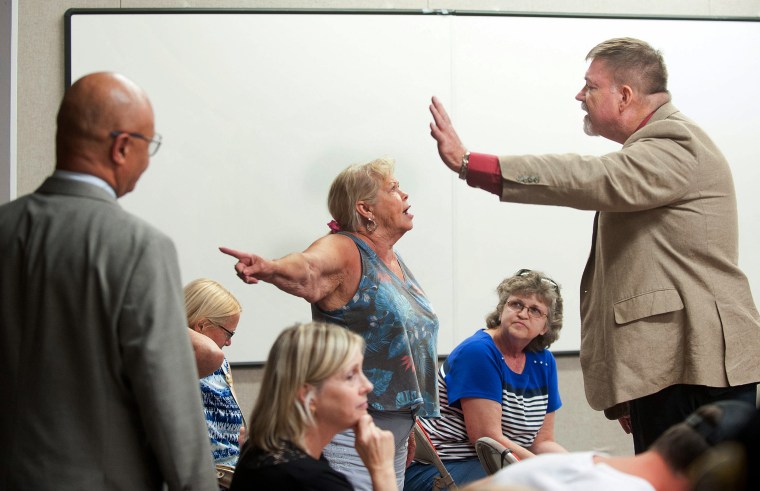
The local backlash to addressing race in schools has been fueled in part by national conservative groups and activists, who see the anti-critical race theory fights as a winning political issue and have helped parents mobilize. As more parents confronted administrators over diversity and equity initiatives over the past year, their activism has been highlighted by conservative media, amplifying the pressure on districts.
“A single school district can’t combat a national propaganda machine that’s intent on pushing a particular narrative and driving wedges in communities,” said Tracey Benson, associate executive director of the Arizona School Boards Association.
Hoping to avoid upset parents coming to board meetings, some districts have not only scrutinized instructional materials, they’ve also curtailed student speech.
"A single school district can’t combat a national propaganda machine that’s intent on pushing a particular narrative and driving wedges in communities."
Tracey Benson, Arizona School Boards Association
After a student-designed yearbook cover in Texas included the words “science is real, Black lives matter, no human is illegal, love is love,” the school district placed an art teacher on leave over parent complaints. A district in New York censored a presentation about racial justice created by a group of eighth graders. A Florida school district temporarily halted the sale of a student-produced yearbook because it discussed the Black Lives Matter movement, but did not mention the pro-police “Blue lives matter” slogan.
Rita Kohli, an education professor at the University of California, Riverside who studies the racial climate in schools, said schools need to trust children to be independent thinkers.
“I don’t think schools should ever be indoctrinating kids,” she said, “but what are we saying about schools if we say any time they bring in a touchy subject it’s indoctrination? What are they doing the rest of the time?”
One stayed, one resigned
Brittany Hogan became the diversity coordinator for the Rockwood School District, in the suburbs of St. Louis, last year. She was the only Black woman in the mostly white district’s administration, which could be isolating at times, she said. But she also felt she had a critical role to play for students of color.
“For a lot of Black students, the only time they see a reflection of themselves is when they see me,” she said.
St. Louis County has the largest and longest-running school desegregation program in the country, which Hogan oversaw, busing students from the city to the predominately white suburban schools. Rockwood, where 75 percent of students are white, enrolls 1,400 children from St. Louis.
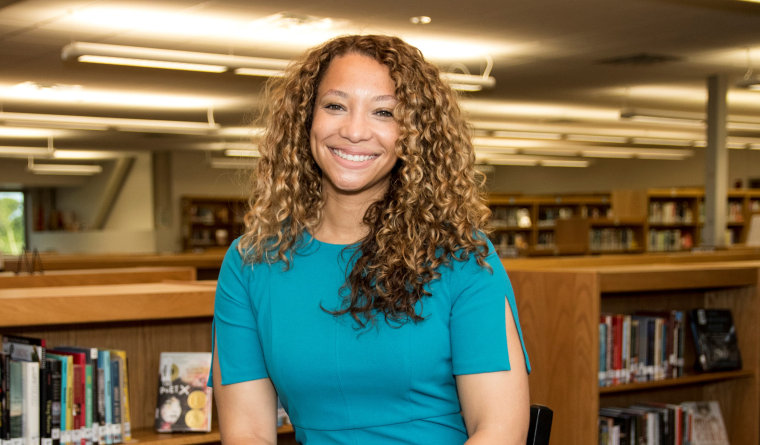
Shortly after last fall’s election, Hogan said, she started receiving letters from parents who did not approve of diversity initiatives and a districtwide reading program that included books by Black authors. One woman called her to say her work was “ungodly” and that she would pray for her, Hogan said.
Emails to administrators obtained by NBC News through a public records request show community members began to dig up Hogan’s old tweets, claiming she made comments that were racist against white people. In one tweet that parents repeatedly cited, Hogan wrote “new podcast alert” with a screenshot for “Nice White Parents,” a series produced by The New York Times that examines efforts to address inequality in Brooklyn schools. Parents inaccurately claimed in emails to administrators and school board members that Hogan had tweeted that “the problem in public schools is white parents” and that she was “blaming white people.”
Things escalated in March when the superintendent announced his decision to bar “thin blue line” symbols — which are black, white and blue variations of the American flag meant to support police — from baseball uniforms. Though Hogan had no involvement in the decision, she began receiving threats a day later. By the end of the week, the district had hired security to patrol her house and that of Terry Harris, another Black administrator in Rockwood who received threats. Hogan became too scared to come to the district office for work.
“While I was in a position of power, I was the lowest on the totem pole in terms of societal power, being a Black woman,” she said. “I was an easy target in the face of race and racism.”
Harris, Rockwood’s director of student services, was also growing concerned. On social media, people posted pictures of him with his teenage daughter and called him the “most racist person” they’d ever met. He changed his work schedule in response to the threats. Emails show he repeatedly offered to arrange a phone call or in-person meeting with parents to address their concerns, which he hoped would ease their anxiety, but parents insisted he answer their questions about diversity and equity initiatives in writing.
“We know what this story is about,” Harris said. “It’s about talking about race, and we are the two highest-ranking Black people in the district.”
He considered leaving his job to spare his family from the harassment, but he said he decided against it after conversations with a school board member, his mentor and his wife.
“Critical race theory is going to go away, but you know something is going to replace critical race theory and whatever does replace it is going to be race-related,” he said. “You get to a point where you are not afraid anymore.”
For Hogan, the toll of the harassment was too much. She submitted her resignation letter in April. It was a difficult decision, she said, because she loved the work.
“One of the biggest joys I have is being an educator,” said Hogan, who plans to work in the nonprofit sector. “But the job didn't seem worth my emotional and physical safety. Mentally, it was disrupting my inner peace, the stress of it.”
It’s a stark contrast from last summer, when Hogan believed people were ready to have “real conversations about race and equity and how those things were impacting all of us in this country.”
“I feel like we’re never as far as we think,” she said.
